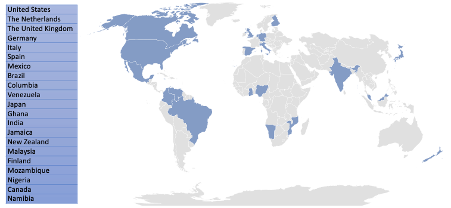Menu
- Fees Booklet
- Academic Calendar 2024
- Study Opportunities 2024
- House Committee Elections 2024
- Spring Graduation Ceremonies 2023
- SRC Online Elections 2023
- ENVISION2030 Institutional Awards
- Autumn Graduation Ceremonies 2023
- Court Order 29 Mar 2022
- Court Interdict application 28 Mar 2022
- Career Leaflets
- Handbooks
- Court Order – Forums Threat
- ENVISION2030
- Why Choose DUT
- “Missing Middle” application form
- NSFAS New Students
- NSFAS
- Honorary Doctorates
- DUTLink Newsletter
- Lecture Timetable
- Association of Commonwealth Universities
DUTLINK
Our Facebook Page
 m
m
INTERNATIONAL VIRTUAL ENGAGEMENT (IVE)/COLLABORATIVE ONLINE INTERNATIONAL LEARNING
Less than 1% of the student population in Africa are able to participate in study abroad opportunities. The most prominent challenge is access due to lack of funds needed to facilitate such participation. At DUT, we have had to look at alternative ways of extending and enhancing the benefits of Internationalisation to more students. IVE and COIL are teaching and learning methods practiced at DUT since 2013 with the aim of increasing this opportunity to 100% of the DUT student community as well as to enable inclusivity and mutuality of global perspectives into our curriculum.
What is COIL?
COIL as an expression of IVE is an approach that brings students and academic staff together across cultures to learn, discuss and collaborate as part of their curriculum. Academic staff are partnered to design a project within a course that is aimed to address specific learning outcomes. Student’s partner and collaborate to complete the activities designed for the project to achieve the learning outcomes.
COIL is a new teaching and learning paradigm that promotes the development of intercultural competence across shared multicultural learning environments. Through the use of Internet-based tools and innovative online pedagogies, COIL fosters meaningful exchanges between university-level teachers and students with peers in geographically distant locations and from different linguacultural backgrounds. Our method links a class at a U.S. institution with one at a college or university abroad. Courses are co-equal and team-taught by educators who collaborate to develop a shared syllabus that emphasizes experiential and collaborative student-cantered learning. In most cases students are enrolled, charged tuition, and awarded grades only at their home institution. While the international component of the course takes place solely online, the individual courses may be fully online or, more often, are offered in blended formats with traditional face-to-face sessions taking place at both schools.
A COIL course is specifically designed to link students who have different cultural and geophysical perspectives and experiences. A typical online course may include students from different parts of the world; however, a COIL course engages students in learning course content both through their own unique cultural lens and also by exchanging their cultural and experiential lenses as they move through the learning material together. By helping students to reflect with each other, you and your partner instructor will be facilitating a cross-cultural dialogue that brings a global dimension to your course content.
In line with increasing access, COIL is used as a conduit to achieve the aims of Internationalisation and decolonisation of the curriculum by the purposeful increase and enhancement of international perspectives that have traditionally been excluded within our curriculum. Through strategic institutional support, there is an academic drive to ensure that annual curriculum evaluation takes place through the lens of Internationalisation and decolonisation of the curriculum. At DUT, the concept of decolonisation goes hand in hand with Internationalisation, putting Africa at the centre, but not to the exclusion of all other perspectives, especially those within the global south.
COIL allows for a dynamic and inexpensive curricular innovation to engage students in online environments. COIL partnerships provide faculty members with opportunities to collaborate with colleagues outside of their institution with the potential to learn new teaching techniques and forge research partnerships.
As a form of virtual mobility, COIL can allow students to collaborate with and learn from peers from different cultures, with different realities, and with different ways of approaching an issue.
Benefits of COIL for student learning:
- Increase intercultural awareness
- Enhance communicative skills for working with non-native English speakers
- Develop digital literacy skills for working in virtual teams
- Learn about their discipline from another perspective
- Engage in global problem solving
IVE/COIL @ DUT
Our strategic partnerships with universities in countries from the global south facilitates these aims and objectives. Through these partnerships, increased perspectives is facilitated through structured COIL projects embedded within our modules offered as part of our degrees and diplomas.
Furthermore, through COIL and IVE activities, the transfer of local knowledge to the international stage is facilitated. Indigenous knowledge systems are given a space on the international stage by students and staff adding their voices to the global expert fields that the activities occur in.
In addition, our partnerships in countries such as the USA, the UK and Europe have been strategically developed and maintained to allow for enhanced diversity in the classroom, thereby further increasing international perspectives within our classroom. These partnerships are with institutions similar in ethos and values to that of our own, allowing for further facilitation of these objectives.





